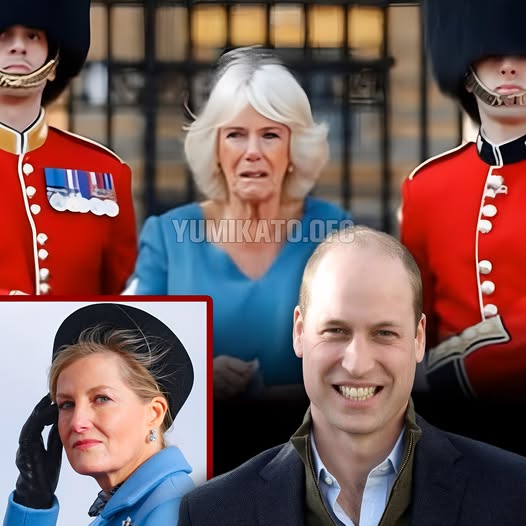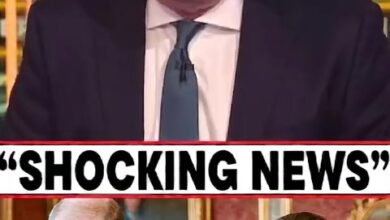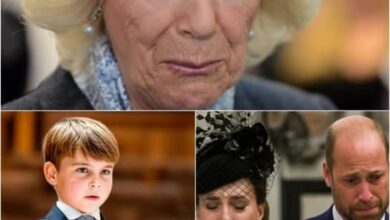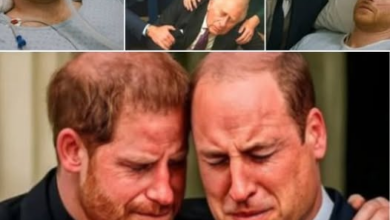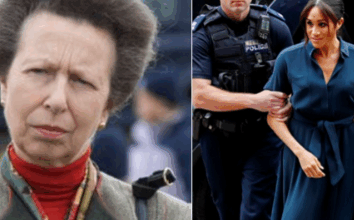7 MINUTES AGO! William’s Hidden Smile, Camilla’s Chilling Whisper — And the Rumor That Rocked Buckingham Palace
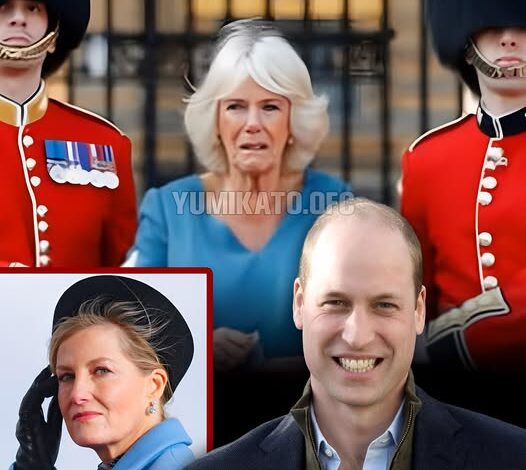
7 MINUTES AGO! The rumor arrived like a gust through the palace colonnade—fast, cold, impossible to ignore. A door closed. A motorcade idled. Somewhere inside Buckingham, a private corridor emptied as if someone had pulled the plug on the day. In those seven minutes, the narrative snapped into place: William’s mouth curled into what looked like a sly, involuntary smile; a semicircle of senior royals stared ahead in stunned silence; and Queen Camilla—missing from a string of engagements already—was said to be gone. Not a quiet retreat. Not a strategic pause. “Kicked out,” the internet said, with the gleeful certainty of people who have waited years to say it.
It wasn’t supposed to unfold in the glare of July. The plan, if there was one, had been a long, gentle fade—rest, recalibration, a fewer number of appearances, a soft re-entry once the storm passed. But the storm chose its own choreography. Two Windsor events scrubbed without replacement. An Edinburgh visit trimmed to video messages. Then a London charity engagement where the dais had a conspicuous gap at center-right—no brooch, no blue silk, no familiar tilt of the head. The press corps smelled blood. The hashtags wrote themselves. Diana’s admirers—who keep score with generational memory—celebrated as if an old verdict had finally been read.
And then Camilla appeared—no palace backdrop, no velvet rope, just the neutral daylight of a community center foyer and a hallway of framed donor plaques. A microphone lifted. A dozen phones hovered. She didn’t blink.
“I never imagined I would have to explain my own home… but perhaps it’s time people heard the truth from me.”
She didn’t say more, not then. That was the first shard: my own home. Not the palace. Not the King’s house. The line landed with the dull thud of furniture being moved at midnight—quiet, unmistakable, permanent. She added only that “a lot has been twisted,” and that she remained “fully committed” to her role. It sounded less like a defense than a marker placed on a board everyone else was pretending not to see.
The board had been shifting for weeks. Schedules were not merely changed; they were unmade. Behind the façade of stability, calendars bled red. A private family lunch was expanded at the last moment, the guest list adjusted without explanation. A rehearsal for a small investiture was moved from the Crimson Drawing Room to a smaller chamber down the hall—health reasons, someone said, though no one asked whose. And then there was the photograph: William at a reception, eyes lowered, a thin smile he either couldn’t or wouldn’t hide. A harmless frame if the world were not primed for meaning. But the world was primed. It saw what it wanted: a son who believed a chess piece had finally lifted off the board.
What followed was not silence but a new frequency of noise. Texts pinged through the hive of royal reporting; a handful of “insiders” suddenly found their phones ringing at odd hours. The word expelled bobbed to the surface—ungrounded, juicy, irresistible. Palace aides did what they always do when the internet invents teeth: they clenched. One described the household as “pressurized.” Another called it “a vacuum that hums.” The official desk issued nothing at all.
Inside that vacuum, two things can be true at once. One: Camilla’s absence from a sequence of events was conspicuous enough to sustain a rumor. Two: conspicuous absence does not equal exile. It equals leverage. And leverage, in this family, is never declared. It is implied.
She surfaced again forty-eight hours later at a different charity—with a different tone. There was a crispness to it, something cut on the diagonal. Reporters asked the question directly. Were you kicked out of the palace? She didn’t flinch.
“The truth will always find its way—and when it does, I believe people will be surprised.”
Surprised is not the same as vindicated. Surprised is a warning disguised as a shrug. The line ricocheted through the corridors faster than any official note could travel. The people who track these things for a living reached for their dictionaries. Surprised by what, exactly? A medical explanation? A logistical one? Or the kind the monarchy dreads more than illness—the kind where the past is not past, where old recordings breathe, where private letters grow legs?
The thing about the British monarchy is that it survives by convincing you nothing ever really changes while everything around it absolutely does. And something had changed. The public had seen the picture: William’s mouth flickering, the small-boned stillness of those seated around him, the space in the seating plan where Camilla would normally be. They had heard the quote. They had read the rumor. They had decided the story. That is how institutions break—first in interpretation, then in practice.
But the practice betrayed nothing. Motorcades ran. Red boxes were opened and closed. Gardeners trimmed the yew with the monastic discipline the palace has always demanded. In that discipline, gossip grows tired. Unless someone feeds it.
Someone did. A fragment, barely more than a sentence, slid into a mid-market tabloid on page five, the part everyone pretends not to source. It described the moment the car doors closed that day, the last thing Camilla said before the convoy pulled away. Three words, a murmur really, easy to miss unless you were listening for it. The fragment called it “chilling,” and the word stuck.
Before we get there, you must understand the choreography of split screens. In one frame: William, inheritor of a thousand years of learned composure, trying not to give the camera a headline with his face. In another: aides triangulating; who gets briefed, who doesn’t, who can be trusted to share only the sentence and not the paragraph. In a third: a Queen consort who has learned, through public bruising and private stamina, that the most lethal thing you can do in a knife fight is refuse to bleed.
The fight is not new. It is simply new again. There are those in this country who will never make peace with the woman who replaced their myth. There are those who will always call her the right wife at the wrong time. There are those who know the limits of love and the stamina of duty, and there are those who pretend not to. The palace’s genius has been to give each camp just enough ritual to keep them calm. Ritual malfunctioned this week. And when ritual malfunctions, memory rushes in.
Diana’s admirers popped champagne on social media, as if the rumor itself were justice. They wrote about “final moments,” which is a phrase best left to doctors and poets. But they meant final moments in the building, not final moments of life. They meant an ending to a presence they had never accepted. They meant a prologue to something else—something they imagine looks like rightness.
Rightness is a story you tell yourself so the mess makes sense. Families do it. Nations do it. Monarchies, most of all. The truth is usually uglier and smaller. The truth is a handful of uncomfortable facts living in the same room at once: the King’s health matters; the Queen’s workload matters; the heir’s image matters; the institution’s survival matters; the press’s hunger matters; the public’s grief and pettiness and decency and cruelty all matter, because they are oxygen, and the House breathes them.
So what were the three words? They were not the bloody valediction the internet begged for. They were not a confession. They were not a threat that could be entered into a ledger. They were something worse for the monarchy and better for the writer of this sentence: open enough to mean anything, sharp enough to cut everyone.
“This isn’t over.”
That is what the driver heard as the door thudded shut. Three syllables of defiance, fatigue, and promise. Not rage. Not surrender. A statement of fact, and of intent.
What followed was a choreography of denial and compliance. No one confirmed exile. No one corrected schedules. The palace stayed where it always stays—ten paces behind and three paces above, insisting the view is unchanged while privately moving the chairs. The Queen’s patronage teams placed soft calls to reassure directors their funding breakfasts would not be cancelled in perpetuity. The heir’s staff workshopped verbs for the next week’s speeches—support, fortitude, continuity—words that do well on plaques and badly on phones.
Meanwhile, the people who actually live in those rooms—the ones who sweep the parquet and polish the banisters and keep the green baize doors from squeaking—told each other what they had seen. No suitcases. No shouting. A change in route. A look, exchanged and withheld. A hinge catching, then releasing. The small mechanics of a large myth.
If you are waiting for the shattering, here is the truth: monarchies do not shatter. They hairline. They spiderweb. The fracture lines are only visible up close, to the people who touch the glass every day. The rest of us see a perfect pane until one morning we do not.
Will this be that morning? Not today. Not yet. But you can hear the future rehearsing. In the heir’s half-smile that should have been a neutral line. In the Queen’s choice of my own home in a sentence designed as a shield. In a three-word whisper you can project anything onto: threat, vow, prophecy.
Diana’s name will be thrown into the air like confetti every time the story needs glitter. Her admirers will read in William’s mouth what they want to see, and perhaps they will be right, perhaps not. Camilla’s detractors will call any absence a victory and any presence a wound. The King will go on being—ill, stubborn, human, crowned. The machine will hum. Pages will be turned. Pins will be pinned. Doors will open and close without telling you why.
But here is the sentence you came for, the one that will sit in the back of your mind the next time a calendar changes or a car door slams on a hot afternoon: She wasn’t running. She was resetting the board.
And if the board has been reset, every piece now carries risk it didn’t carry last week. Every smile is a sentence. Every absence is a rumor. Every rumor is a rehearsal. For what? For the next seven minutes when everything feels like it could tip. For the moment when a whisper in a motorcade becomes a chapter in a nation’s memory. For the time, not yet, when “This isn’t over” will be less a warning and more a description of how this family survives.
No statement will close this. No balcony wave will erase it. The only thing that might is boredom—and this House has not been boring in our lifetimes. So watch the corridors. Watch the calendars. Watch the way the air changes when a door clicks into its frame. If you think you know what happened this week, you are either reading a script the palace wishes you would, or one you wrote for yourself so the noise has a beat.
Either way, the line stands. It is three words long. It is a dare, and a diagnosis. And it is correct—about marriages, about monarchies, about myths that outlive the people who feed them.
